Therapies and Interventions
Achieving Auditory Processing Goals in Speech Therapy
Fathom the depths of auditory processing challenges in speech therapy and discover the strategies that lead to remarkable breakthroughs.
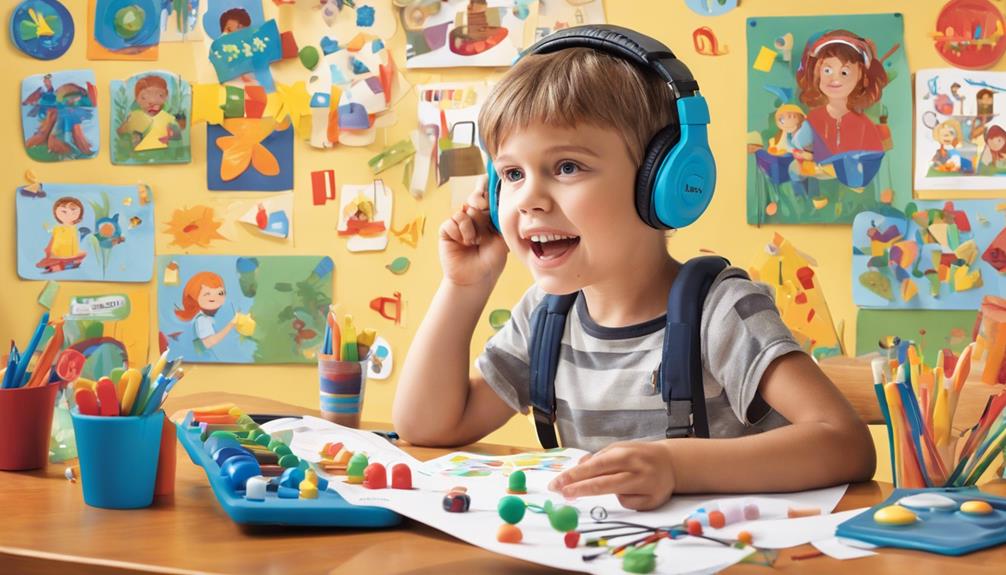
As speech therapists, we guide our young clients through the complex journey of auditory processing, much like steering a vessel through a maze of sound waves.
The journey towards achieving auditory processing goals in therapy requires meticulous planning, precise execution, and unwavering patience. Each milestone reached is a testament to the dedication and perseverance of both the therapist and the child.
Join us as we unravel the strategies and techniques that pave the way for improved auditory processing abilities in our young charges.
Key Takeaways
- Tailored interventions improve auditory processing skills.
- Speech therapists collaborate for personalized therapy plans.
- Customized listening exercises target specific deficits effectively.
- Progress monitoring and support systems enhance communication outcomes.
Understanding Auditory Processing Challenges
In examining the prevalence of auditory processing challenges among school-aged children, it becomes evident that these issues significantly impact various aspects of learning and development.
Central Auditory Processing Disorder (CAPD) is a condition where the brain has difficulty processing auditory information correctly. Children with CAPD may struggle with distinguishing speech sounds in noisy environments, following verbal instructions, and remembering information they've heard. These difficulties can lead to academic challenges, social communication issues, and frustration in educational settings.
Diagnosis of CAPD is typically done through comprehensive assessments conducted by audiologists or speech-language pathologists. These assessments evaluate the child's ability to discriminate between sounds, comprehend spoken language, and remember auditory information.
Treatment for CAPD often involves a multidisciplinary approach, including speech therapy, educational accommodations, and strategies to improve listening skills. Understanding and addressing CAPD is crucial in supporting the learning and development of children with auditory processing challenges.
Importance of Auditory Discrimination

Examining the significance of auditory discrimination in speech therapy reveals its crucial role in enhancing language processing and communication skills for individuals with auditory processing challenges. Auditory discrimination is the ability to differentiate between similar sounds, a skill vital for effective communication and language development in speech therapy. Here are five key points emphasizing the importance of auditory discrimination:
- Enhances Language Processing: Auditory discrimination allows individuals to distinguish between subtle auditory cues, improving their ability to process language effectively.
- Aids in Speech Sound Understanding: Strong auditory discrimination skills help in understanding and producing speech sounds accurately, crucial for clear communication.
- Impacts Phonemic Awareness: Difficulties in auditory discrimination can affect phonemic awareness, which is essential for reading and language skills development.
- Improves Communication Skills: Targeting auditory discrimination assists individuals with auditory processing challenges in accurately distinguishing and processing sounds, leading to improved communication abilities.
- Supports Language Development: Developing auditory discrimination skills supports overall language development by enhancing the individual's ability to perceive and interpret speech sounds accurately.
Targeting Auditory Sequencing Skills
Developing auditory sequencing skills plays a crucial role in enhancing listening comprehension and language processing abilities in individuals undergoing speech therapy. Auditory sequencing skills involve the capacity to organize and recall sounds or information in a specific order. By targeting auditory sequencing skills through tailored activities, individuals with Auditory Processing Disorder (APD) can experience improvements in memory, attention, and overall auditory processing.
Sequential auditory tasks not only aid in following instructions but also facilitate understanding narratives and active participation in conversations for individuals with Central Auditory Processing Disorder (CAPD). Strengthening auditory sequencing skills in speech therapy settings can significantly support academic success, enhance social interactions, and improve daily communication for individuals facing challenges with APD.
Therefore, incorporating exercises that focus on auditory sequencing can lead to notable enhancements in various aspects of auditory processing, ultimately benefiting individuals undergoing speech therapy.
Enhancing Auditory Memory Abilities

When focusing on enhancing auditory memory abilities, we prioritize memory strategies specifically tailored for auditory information retention.
In speech therapy, auditory memory games serve as effective tools to engage individuals and improve their recall capabilities.
Memory Strategies for Auditory
Implementing memory strategies tailored to an individual's learning style can significantly enhance auditory memory abilities in individuals with Central Auditory Processing Disorder (CAPD). Working Memory plays a crucial role in processing auditory information efficiently. Here are five key strategies to enhance auditory memory skills:
- Chunking information into smaller units for easier recall.
- Using mnemonic devices or memory aids customized to the individual's preferences.
- Encouraging active listening techniques like summarizing information.
- Engaging in regular practice activities challenging auditory memory.
- Incorporating multisensory approaches to reinforce memory connections.
Auditory Memory Games
To further enhance auditory memory abilities, exploring auditory memory games can provide an interactive and effective approach for individuals with Auditory Processing Disorder (APD).
Auditory memory games help improve recall and retention of auditory information, crucial for individuals with APD. These games enhance short-term memory, auditory sequencing, and auditory processing skills in a fun and engaging way.
Activities like repeating sequences of sounds, identifying sound patterns, and recalling auditory instructions are common in auditory memory games. Research shows that regular practice of auditory memory games can lead to significant improvements in auditory memory abilities.
Speech therapists often incorporate auditory memory games into therapy sessions to target specific auditory processing goals and enhance overall communication skills.
Improving Auditory Recall
Enhancing auditory memory abilities in speech therapy involves implementing structured activities and exercises aimed at strengthening neural pathways critical for auditory processing and memory retention. Strategies such as chunking information, repetition, and multisensory techniques play a vital role in improving auditory recall skills. Individuals with Auditory Processing Disorder (APD) often face challenges with auditory recall, impacting their learning and communication abilities significantly. Speech therapists utilize targeted interventions to address auditory memory deficits, ultimately enhancing overall communication skills. Effective approaches in speech therapy focus on fortifying the neural connections involved in auditory processing and memory retention.
- Chunking information aids in processing.
- Repetition enhances memory retention.
- Multisensory techniques improve recall.
- APD individuals struggle with auditory recall.
- Speech therapists target auditory memory deficits.
Strategies for Auditory Processing Goals

When considering strategies for auditory processing goals in speech therapy, it's crucial to focus on enhancing listening skills development and memory retention techniques.
By implementing targeted auditory discrimination tasks and memory exercises, we can effectively improve processing abilities.
Utilizing multi-modal approaches, technology tools, and collaboration with parents and educators are essential components in supporting individuals with auditory processing challenges.
Listening Skills Development
In speech therapy for auditory processing goals, one effective approach to fostering listening skills development involves incorporating auditory discrimination tasks. These tasks help individuals differentiate between similar sounds, enhancing their ability to process auditory information accurately.
- Practice identifying minimal pairs (e.g., 'cat' vs. 'hat') to improve sound distinctions.
- Engage in sound blending exercises to enhance auditory processing speed.
- Utilize sound categorization tasks to classify sounds based on their unique characteristics.
- Implement auditory feedback activities to reinforce correct sound identification.
- Encourage active listening exercises to promote sustained attention to auditory stimuli.
Memory Retention Techniques
To facilitate memory retention in individuals undergoing speech therapy for auditory processing goals, techniques such as chunking information and employing mnemonic devices prove effective strategies. Chunking involves breaking down information into smaller, manageable segments, aiding recall for those with auditory processing difficulties.
Mnemonic devices, like acronyms or visual imagery, can further enhance memory retention by providing associations that trigger recall. Repetition and rehearsal strategies are vital in reinforcing auditory information, improving memory retention over time.
Multisensory learning approaches, incorporating visual aids and tactile cues, can also strengthen memory retention. Structured practice activities, progressively increasing in complexity, help individuals with auditory processing challenges enhance their memory retention skills during speech therapy sessions.
These memory retention techniques form a crucial part of achieving auditory processing goals in speech therapy.
Techniques for Improved Communication
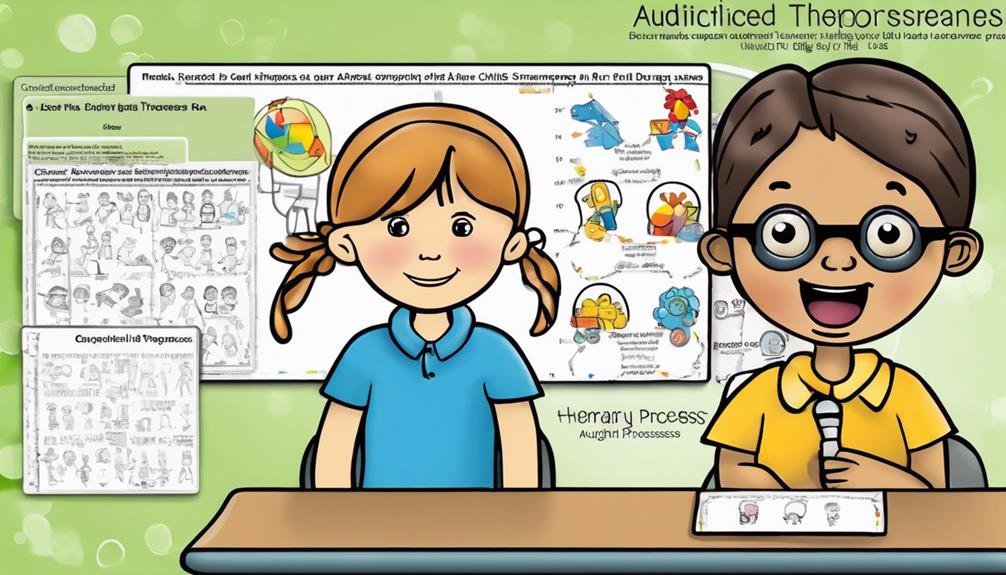
Utilizing a combination of auditory processing activities and visual aids enhances communication skills in speech therapy sessions. By integrating various techniques, therapists can effectively improve auditory processing skills and overall communication abilities in their clients.
- Sound Discrimination Tasks: Engaging in activities that require distinguishing between different sounds helps sharpen auditory discrimination skills.
- Multisensory Approaches: Combining auditory tasks with visual or tactile stimuli can enhance comprehension and retention of information.
- Conversation-Based Activities: Participating in conversations that demand active listening and response fosters the development of effective communication strategies.
- Tailored Sessions: Customizing therapy sessions to target specific auditory processing deficits, such as auditory closure or sound blending, can result in significant improvements in communication outcomes.
- Gestures and Visual Aids: Using gestures and visual aids alongside auditory tasks can facilitate understanding and reinforce learning during speech therapy sessions.
Role of Speech Therapists
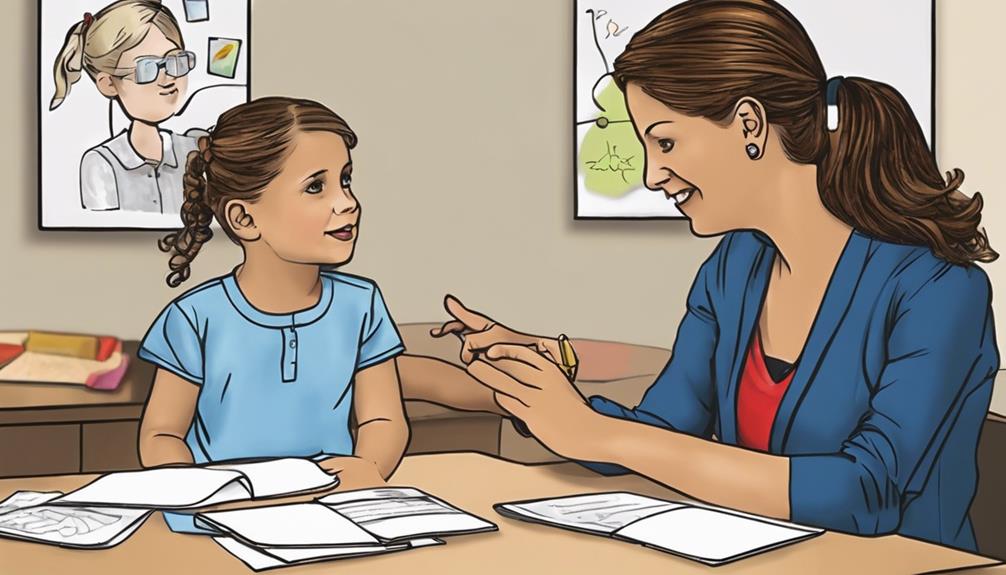
As speech therapists, we play a vital role in targeting specific auditory processing skills in children with APD. Our focus lies in enhancing auditory discrimination, memory, and comprehension through tailored interventions.
Therapist's Vital Role
Speech therapists play a crucial role in assessing and treating auditory processing difficulties in individuals with Central Auditory Processing Disorder (CAPD). This involves collaborating with audiologists, educators, and other professionals to create personalized therapy plans. These plans include structured interventions to enhance auditory discrimination, comprehension, and memory. Speech therapists also set measurable goals to monitor progress and provide continuous support to empower individuals with CAPD in different communication and learning settings. Their expertise helps improve the quality of life for individuals with auditory processing disorders through specialized interventions and support.
These professionals are pivotal in evaluating and treating auditory processing difficulties in individuals with CAPD. Their role encompasses a wide range of essential tasks to effectively support those with auditory processing disorders.
Targeting Specific Skills
In therapy sessions targeting specific skills related to auditory processing, speech therapists focus on enhancing the individual's ability to accurately process and interpret auditory information through structured activities and exercises. We target auditory discrimination, sequencing, and memory, tailoring interventions to address deficits like auditory figure-ground discrimination or auditory closure.
By utilizing auditory processing games, sound blending activities, and auditory processing worksheets, we aim to improve listening and comprehension skills. Collaboration with audiologists and educators is crucial to create a comprehensive treatment plan supporting the development of auditory processing abilities.
Our goal is to provide effective strategies that enhance auditory processing skills, ultimately improving the individual's overall communication and learning outcomes.
Building Confidence in Communication

To enhance confidence in communication for individuals with auditory processing goals, targeted practice and positive reinforcement are key components. Encouraging active listening skills and providing opportunities for successful communication experiences can boost confidence. Tailoring therapy activities to individual preferences and strengths can help build self-assurance in communication. Addressing underlying anxieties or frustrations related to auditory processing challenges is essential for confidence-building. Celebrating progress, no matter how small, can significantly enhance self-esteem and motivation in communication skills development.
- Active listening skills and successful communication experiences boost confidence.
- Tailored therapy activities based on preferences and strengths enhance self-assurance.
- Addressing anxieties and frustrations related to auditory processing challenges is essential.
- Celebrating even small progress enhances self-esteem and motivation.
- Positive reinforcement and targeted practice are key components for building confidence in communication.
Effective Processing of Spoken Language
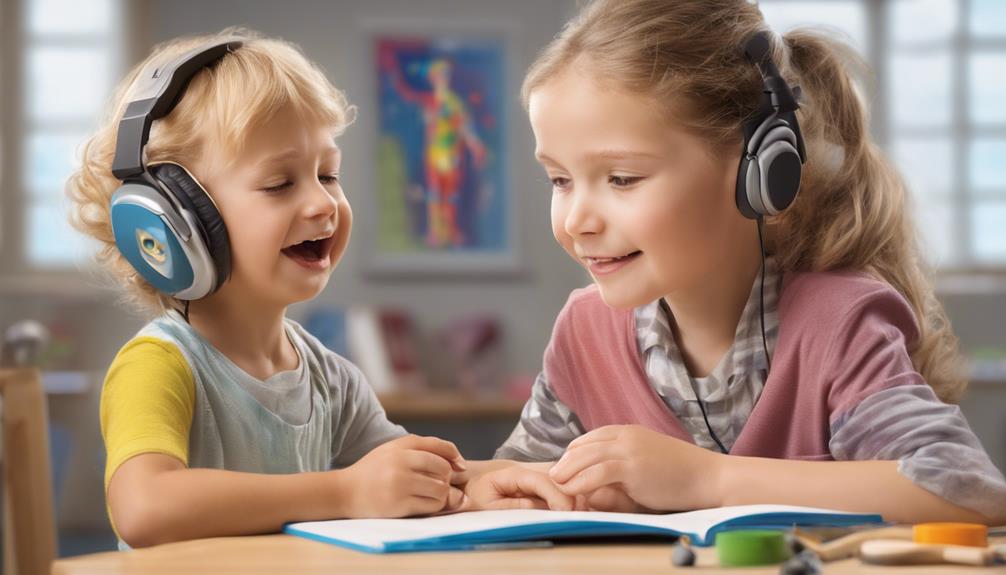
Enhancing auditory processing skills in speech therapy involves targeting key aspects such as auditory discrimination, comprehension, and memory to improve the processing of spoken language effectively. Speech therapists employ structured activities aimed at enhancing the ability to differentiate speech sounds and grasp language content.
Techniques like repetition, auditory feedback, and multisensory approaches play vital roles in achieving auditory processing goals. During therapy sessions, the focus is on improving listening skills, deciphering speech sounds, and understanding language subtleties.
Progress in processing spoken language can have far-reaching benefits, including enhanced communication, academic performance, and social interactions. By honing these auditory processing skills, individuals can experience a significant improvement in their ability to engage effectively in conversations, comprehend information accurately, and navigate various social contexts with confidence.
The tailored interventions provided by speech therapists help individuals develop a strong foundation for processing spoken language efficiently, leading to improved overall communication abilities.
Impact on Quality of Life
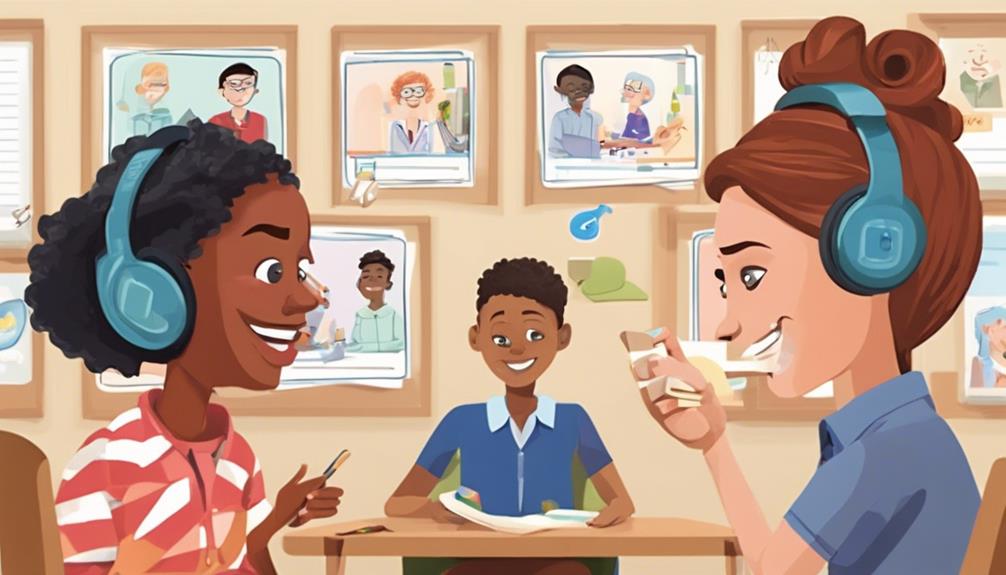
Improving auditory processing skills through speech therapy can have a profound impact on an individual's overall quality of life. Addressing auditory processing goals not only enhances communication abilities but also influences various aspects of daily living. Here are five key ways in which achieving auditory processing goals can positively affect quality of life:
- Enhanced Communication Skills: Improved auditory processing abilities lead to clearer and more effective communication, fostering better interactions with others.
- Academic Success: Successfully meeting auditory processing goals can result in improved academic performance and better educational outcomes.
- Boosted Self-Esteem: Advancements in auditory processing skills through therapy can boost self-esteem and confidence in individuals facing challenges with auditory information processing.
- Reduced Frustration and Anxiety: Enhanced auditory processing can decrease frustration and anxiety related to communication difficulties, leading to a more relaxed and fulfilling life.
- Improved Relationships: Acquiring auditory processing goals positively impacts relationships by facilitating better understanding and connection with others.
Tailored Interventions for Each Individual

We tailor interventions in speech therapy to address individual needs, utilizing customized strategies that target specific auditory processing deficits like discrimination, sequencing, and memory.
Our focus lies in improving auditory processing skills through personalized therapy plans that consider each individual's unique strengths and challenges.
The success of achieving auditory processing goals hinges on the specificity and relevance of the interventions to the individual's abilities.
Personalized Therapy Plans
Tailoring interventions in speech therapy for auditory processing disorders involves customizing therapy plans to address the specific auditory challenges unique to each individual. Personalized therapy plans are crucial for effectively improving auditory discrimination skills and other auditory processing deficits.
Here are five key points to consider:
- Comprehensive assessments are essential for identifying individual auditory processing deficits.
- Therapy plans may include strategies to enhance auditory discrimination, memory, and sequencing skills.
- Personalization allows for targeting specific areas of need, like following multi-step directions.
- Customized interventions focus on the precise auditory processing difficulties of each client.
- Individualized therapy enhances effectiveness by addressing the specific auditory challenges of each person.
Customized Listening Exercises
To address specific auditory processing deficits in individuals, customized listening exercises are designed in speech therapy, focusing on enhancing skills like auditory discrimination, sequencing, and memory based on each individual's unique needs. By tailoring interventions to target auditory discrimination challenges, we aim to strengthen the neural pathways responsible for processing sound effectively. These individualized listening exercises are crucial for improving the individual's ability to accurately comprehend and respond to spoken language. Here is a table showcasing examples of customized listening exercises for auditory discrimination:
| Exercise Type | Description | Objective |
|---|---|---|
| Minimal Pair Drill | Contrasting similar sounds | Improve discrimination between sounds |
| Sound Blending Activity | Combining sounds to form words | Enhance auditory sequencing skills |
| Auditory Memory Game | Recalling sequences of spoken information | Strengthen auditory memory retention |
Practical Approaches in Speech Therapy
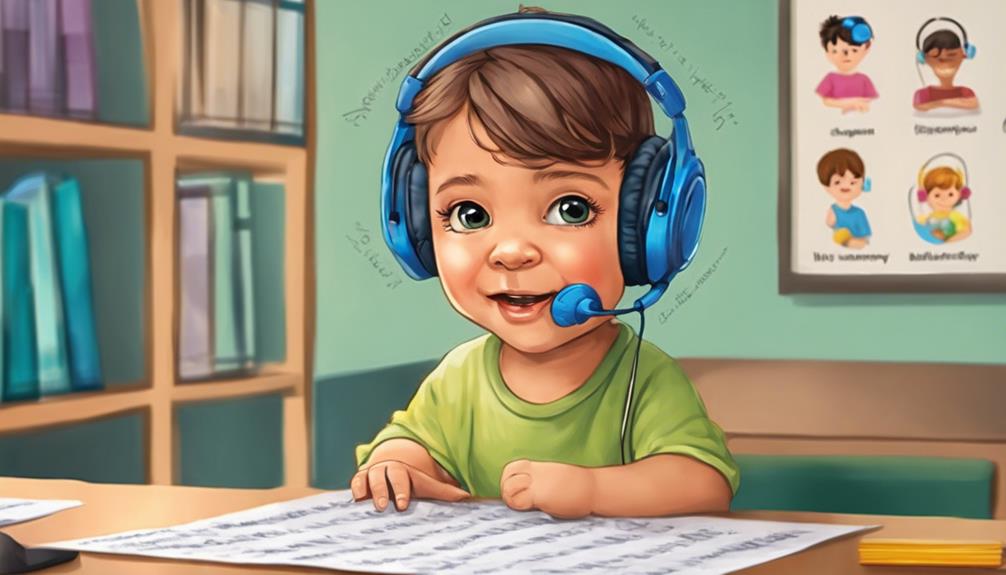
Implementing a variety of multisensory activities is key to engaging auditory processing skills effectively in speech therapy sessions. By incorporating visual and tactile stimuli alongside auditory tasks, we can create a rich learning environment that stimulates multiple senses simultaneously. To enhance auditory processing abilities, consider the following practical approaches:
- Utilize Repetition: Repetitive practice helps reinforce auditory memory and processing skills over time.
- Structured Routines: Implementing consistent routines and visual aids can support auditory processing and comprehension by providing predictability.
- Technology Integration: Explore auditory processing apps and tools to offer targeted practice opportunities and immediate feedback.
- Collaboration: Work closely with educators and parents to establish a supportive setting that reinforces auditory processing goals both at home and in educational settings.
- Feedback Mechanisms: Incorporate mechanisms for feedback during therapy sessions to monitor progress and make necessary adjustments.
These strategies aim to create a holistic approach to improving auditory processing skills in speech therapy.
Progress Monitoring and Adjustments
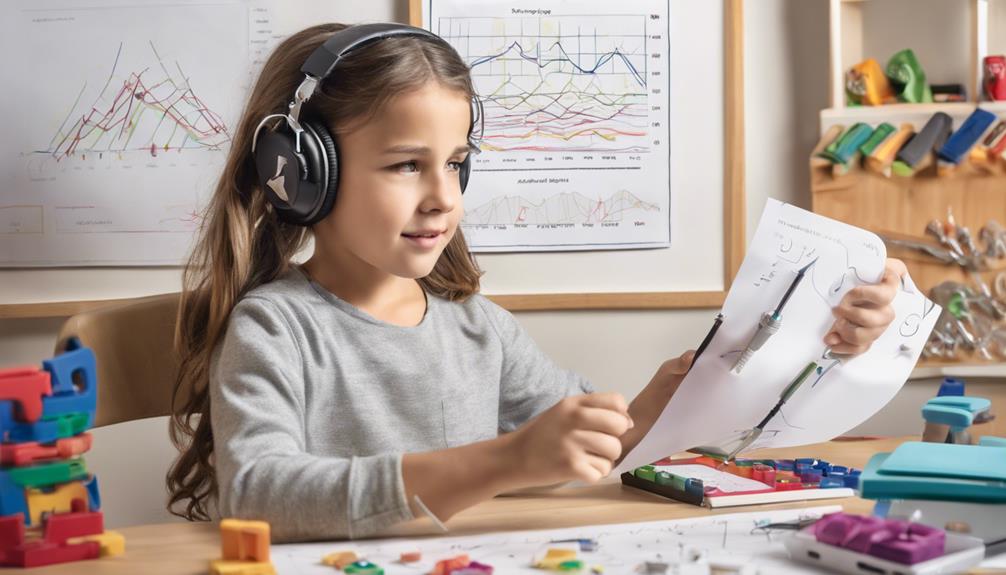
In monitoring progress and making adjustments in speech therapy for auditory processing, tracking improvements in auditory discrimination, comprehension, and memory skills is essential. Progress monitoring allows us to assess the effectiveness of interventions and the individual's response to therapy.
By regularly evaluating auditory processing abilities, we can identify areas of strength and weakness, guiding adjustments to the treatment plan for optimal outcomes. These adjustments may involve modifying goals, strategies, or techniques based on the student's progress in meeting auditory processing benchmarks.
Through progress monitoring, we can tailor our interventions to target specific auditory processing deficits, ensuring that our approach is evidence-based and individualized. Data-driven decision-making is crucial in speech therapy to achieve measurable improvements in auditory processing skills.
Real-Life Applications of Therapy

Enhancing listening skills in challenging environments is a key focus of therapy for auditory processing goals. Real-life applications of therapy for auditory processing goals are essential for improving day-to-day communication abilities. Through targeted strategies and exercises, individuals can overcome obstacles in various settings.
Some key points to consider include:
- Improving listening skills in noisy environments.
- Following multi-step instructions effectively.
- Understanding conversations in group settings.
- Developing strategies for better auditory processing, such as using visual aids.
- Practicing real-world scenarios to simulate busy classrooms or work environments.
These real-life applications are crucial in enhancing auditory memory, recalling information accurately, and comprehending complex auditory input. By incorporating practical scenarios into therapy sessions, individuals with Auditory Processing Disorder (APD) can work towards better functional listening abilities in their everyday lives.
The goal is to provide tailored strategies that address specific challenges, ultimately leading to improved overall communication and social interactions for those with APD.
Achieving Long-Term Success
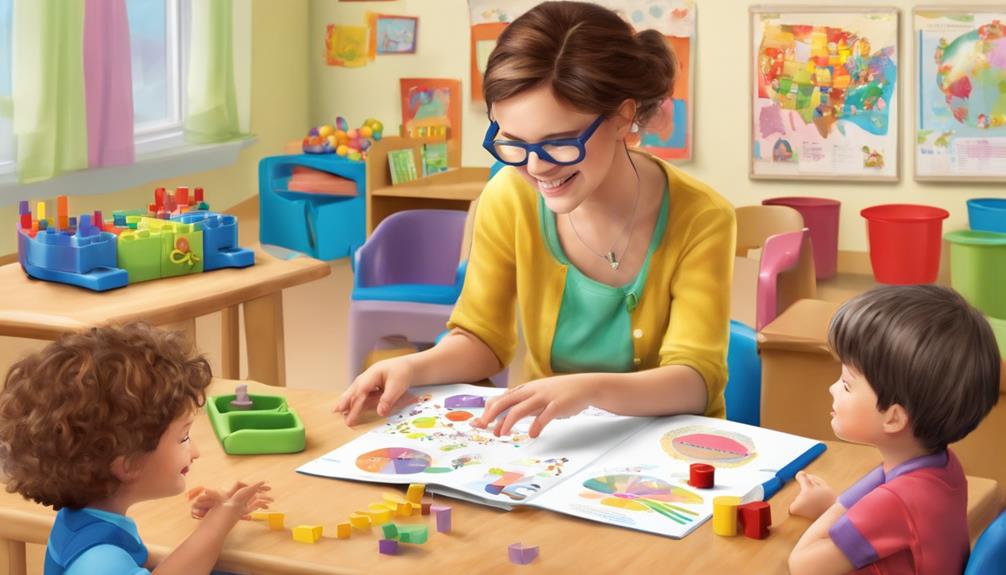
To ensure sustained progress in achieving auditory processing goals in speech therapy, consistent practice and reinforcement of skills over time are essential. Building a strong foundation through structured therapy sessions and home practice routines is crucial for long-term success in developing auditory processing skills. It's important to track progress through regular assessments and adjust therapy goals based on individual needs and improvements to enhance outcomes. Collaboration with parents, teachers, and other professionals is key to creating a supportive environment that fosters continued growth and development in auditory processing skills.
Implementing a holistic approach that combines auditory processing exercises, communication strategies, and environmental modifications can lead to lasting improvements in speech therapy outcomes. By focusing on consistent practice, ongoing reinforcement, and a collaborative support system, individuals can work towards achieving and maintaining their auditory processing goals effectively over time. This approach ensures that progress isn't only made but also sustained, ultimately leading to enhanced communication abilities and quality of life.
Frequently Asked Questions
How to Treat Auditory Processing Disorder in Speech Therapy?
In speech therapy, we treat auditory processing disorder through targeted exercises and activities tailored to individual needs. Our focus is on improving discrimination, comprehension, and memory skills.
Strategies may involve auditory memory games, sound discrimination tasks, and multi-step direction-following exercises. By enhancing auditory processing abilities, we aim to promote effective communication and address specific challenges.
Collaboration with audiologists and other professionals is key in developing a comprehensive treatment plan.
What Are the Goals for Auditory Discrimination in Speech Therapy?
When targeting auditory discrimination in speech therapy, our goals focus on enhancing the ability to differentiate between similar sounds, words, or syllables. By improving these skills, individuals can better grasp spoken language and bolster communication proficiency.
Activities designed to boost phonemic awareness and sound distinction play a crucial role in achieving these goals. Progress in auditory discrimination positively impacts various aspects of life, such as academic performance and social interactions, leading to a higher quality of life.
How Do You Target Auditory Processing?
When targeting auditory processing, we focus on activities like discrimination tasks for distinguishing sounds. Memory exercises help with retaining information. Sequencing tasks aid in processing data correctly. Closure activities improve filling in missing parts of information. Lastly, sound localization tasks enhance locating sound sources accurately.
These techniques are essential for developing auditory processing skills and are valuable in various therapeutic settings.
What Is the Role of a Speech Pathologist in Auditory Processing?
In assessing and treating auditory processing disorders, speech pathologists play a pivotal role. We evaluate auditory processing skills like discrimination, sequencing, and memory to develop tailored therapy plans.
Collaboration with audiologists and educators is essential for effective intervention. Our focus is on enhancing auditory processing abilities, language comprehension, and communication skills.
Through various tools and strategies, we strive to assist individuals with APD in achieving their auditory processing goals.
Conclusion
In conclusion, by diligently targeting auditory processing goals in speech therapy, we can propel children's abilities to new heights, like guiding a ship through uncharted waters with precision and expertise.
Through strategic interventions and tailored approaches, we can unlock the potential for enhanced auditory discrimination, memory, and comprehension skills.
With a commitment to progress monitoring and adjustments, the journey towards achieving long-term success in auditory processing is within reach.
Jamie is one of the creative forces behind the words that resonate with our audience at Deaf Vibes. With a passion for storytelling and advocacy, Jamie delves into topics that matter deeply to the deaf and hard-of-hearing community. Jamie’s articles are crafted with empathy, insight, and a commitment to positive change, from exploring the latest advancements in hearing technologies to shedding light on the everyday challenges and victories of those within the community. Jamie believes in the power of shared stories to inspire action, foster understanding, and create a more inclusive world for everyone.
Therapies and Interventions
3 Benefits of Speech Therapy in Private Practice
A deep dive into the advantages of private speech therapy will revolutionize your understanding of personalized care and transformative outcomes.
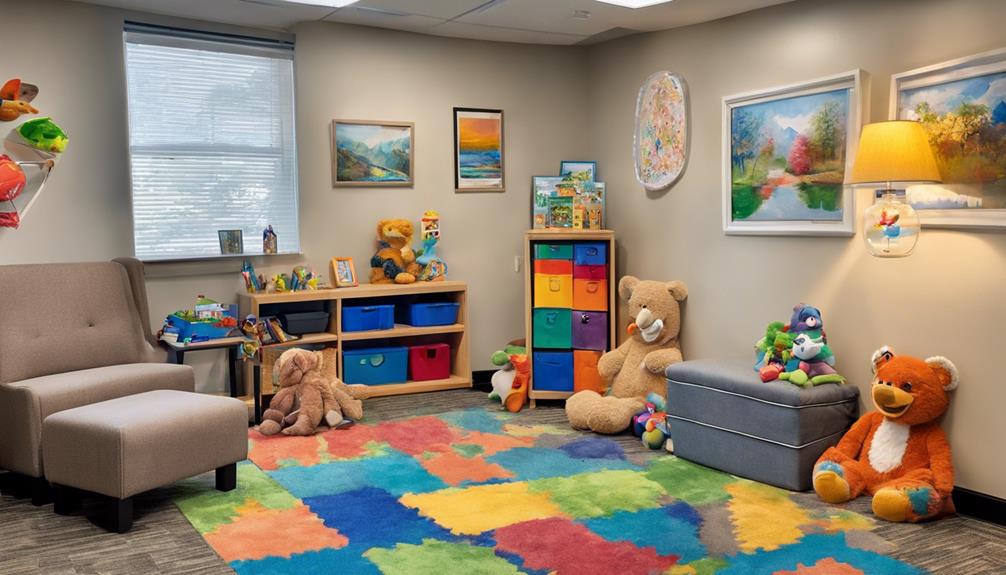
Let's face it – navigating the world of speech therapy can be a bit overwhelming. However, when it comes to private practice, the benefits are undoubtedly worth exploring.
From the tailored treatment plans that cater to individual needs to the enhanced therapy experience, private speech therapy offers a unique approach that yields promising results.
But that's just the beginning; there's more to uncover about how this specialized form of therapy can truly transform lives.
Key Takeaways
- Tailored treatment plans for unique challenges and goals
- Individualized care leading to positive outcomes
- Enhanced communication skills through personalized interventions
- Supportive environment for faster development and better results
Personalized Treatment Plans
In private speech therapy, we tailor treatment plans to address the unique communication challenges and goals of each individual. As speech therapy providers in private practice, our primary focus is on creating a treatment plan that's personalized to meet the specific needs of our clients. By conducting thorough assessments, we can identify the areas that require attention and develop customized interventions for optimal progress.
Individualized attention is at the core of our approach, allowing us to implement personalized strategies that cater to the client's learning style and preferences. Collaborating closely with clients and their families, we ensure that the treatment plan aligns with the individual's communication objectives. This level of personalization enables us to adjust the plan as needed based on the client's progress and evolving communication needs, providing a tailored and effective path towards improvement.
Finding the right speech therapist who can offer this level of individualized care is essential in achieving successful outcomes in speech therapy. By choosing private speech therapy, individuals can benefit from a treatment plan that's specifically designed to address their unique challenges and goals.
Enhanced Therapy Experience

Enhancing the therapy experience for clients in private practice involves tailoring interventions to meet individual needs and fostering a supportive learning environment. In private speech therapy, therapists can focus on individual goals and closely track progress in a personalized manner.
This tailored therapy approach ensures that clients receive specialized attention with targeted interventions designed to maximize outcomes efficiently. The flexible scheduling options offered in private practice enable more frequent and intensive therapy sessions, enhancing the overall progress.
Therapists have the opportunity to create a comfortable and supportive environment that nurtures faster development and better results. By providing a space where clients feel understood and supported, private practice elevates the therapy experience, leading to more effective outcomes and a positive journey towards improved communication skills.
The individualized care and attention to detail in private speech therapy truly make a difference in the overall therapy experience.
Improved Communication Skills
Private speech therapy in a practice setting plays a pivotal role in fostering improved communication skills for individuals of all ages, enhancing their ability to express themselves effectively and confidently.
When considering the benefits of private speech therapy for improved communication skills, it's essential to acknowledge the tailored treatment plans that address specific speech and language pathology concerns. These individualized plans allow the speech-language pathologist to focus on the client's unique communication needs, promoting enhanced language development and comprehension skills.
Additionally, private speech therapy offers a supportive environment where clients can work on boosting their social communication abilities, leading to better relationships and interactions in daily life.
Moreover, confidence levels are elevated through private speech therapy, empowering individuals to navigate various communication challenges with ease and grace.
Frequently Asked Questions
Why Work in Private Practice as an Slp?
We choose to work in private practice as SLPs because it offers unique opportunities for individualized care, flexibility in treatment plans, and the chance to form strong relationships with our patients.
The autonomy and ability to tailor therapy to meet specific needs motivate us to excel in this setting.
Our passion for helping others drives us to seek out environments where we can make a real difference in people's lives.
What Are the Benefits of Private Speech?
We believe private speech therapy offers unparalleled benefits. The individualized attention and tailored treatment plans in private practice lead to faster progress and improved outcomes. Clients experience flexible scheduling, customized therapies, and a supportive environment conducive to learning.
The one-on-one interaction enhances communication skills and boosts confidence. In private speech therapy, specialized care and unique approaches cater to individual needs, promoting effective social communication skills.
Is Private Speech Therapy Worth It?
Yes, private speech therapy is worth it.
We believe that the personalized attention and tailored treatment plans in private practice can truly make a difference in our clients' progress.
The one-on-one interaction with a licensed speech-language pathologist allows for a more individualized approach, leading to enhanced outcomes.
The comfortable learning environment fosters effective communication and boosts confidence.
In our experience, the benefits of private speech therapy are invaluable for our clients.
What Is the Difference Between Public and Private Speech Therapy?
When comparing public and private speech therapy, the key difference lies in the level of personalized attention. In private practice, we receive tailored sessions that focus on our unique needs and goals, creating a comfortable and efficient learning environment. This individualized approach sets private therapy apart from the potentially larger caseloads and less personalized attention in public settings.
Flexible scheduling options further enhance the client's experience and progress.
Conclusion
In conclusion, private speech therapy is like a tailor-made suit for your communication needs, offering a personalized experience that can boost your skills and confidence.
With specialized treatment plans and individualized attention, this form of therapy can help you unlock your full potential and communicate with clarity and ease.
So why not take the leap and invest in your communication journey? The benefits are endless, and the results will speak for themselves.
Therapies and Interventions
10 Picture Scenes for Speech Therapy Success
Foster language growth and spark curiosity with 10 captivating picture scenes designed to revolutionize speech therapy outcomes.

Imagine stepping into a vibrant world where every picture scene is a gateway to improving speech therapy outcomes. These 10 carefully curated visuals offer a dynamic platform for enhancing communication skills in young learners.
From unraveling hidden mysteries to crafting intricate sentences, each scene holds a key to unlocking the potential of every speech therapy session. Explore the power of imagery and creativity in transforming language development with these engaging tools.
Key Takeaways
- Picture scenes aid in language development and storytelling skills.
- Visual aids enhance comprehension, engagement, and vocabulary.
- Language development strategies improve articulation and participation.
- WH question targeting boosts critical thinking and expressive language.
Action Picture Scenes
In our speech therapy sessions, we often rely on action picture scenes to engage our young learners and enhance their language skills effectively. These scenes are invaluable tools for targeting action vocabulary and expressive language development. By depicting various actions performed by people or animals, these scenes provide visual prompts that help children practice using new vocabulary words and forming sentences. Through these visual aids, we can stimulate storytelling skills and encourage the use of expressive language in our therapy sessions.
Utilizing action picture scenes allows us to make language learning more interactive and engaging for our young clients. The dynamic nature of these scenes captures the children's attention and facilitates their understanding of verbs and sentence formation. As speech therapists, we find that incorporating action picture scenes into our sessions not only makes the learning process more enjoyable but also significantly contributes to the children's language development.
Colorful Picture Scenes

When it comes to speech therapy, colorful picture scenes play a pivotal role in engaging young learners and fostering effective communication. These vibrant visual aids serve as powerful tools to stimulate language development and enhance vocabulary skills.
Visual Aids for Therapy
Utilizing colorful picture scenes in speech therapy sessions enhances object recognition and vocabulary development, creating an engaging and effective learning environment. Visual aids play a crucial role in speech therapy by making sessions more interactive and stimulating for clients.
Here are three key benefits of incorporating colorful picture scenes:
- Improved Understanding: Colorful visuals help in conveying new concepts more clearly, aiding in better comprehension during therapy sessions.
- Increased Engagement: The use of vibrant colors captures attention and motivates participants, leading to higher levels of involvement and enjoyment in activities.
- Enhanced Language Skills: Colorful picture scenes are particularly useful for practicing narrative skills, describing scenes, and working on WH questions, promoting the development of language abilities.
Engaging Communication Tools
Colorful picture scenes serve as powerful communication tools, enriching speech therapy sessions with enhanced engagement and accelerated language development. The vibrant visuals not only enhance object recognition but also facilitate picture naming, making learning more effective.
One of the best parts of using colorful picture scenes is their ability to improve understanding of new concepts and speed up reaction times, aiding in quicker progress during therapy. These materials are particularly motivating for children, increasing their participation and focus in sessions.
Stimulating Language Development
Enhancing language development through vibrant picture scenes is a proven strategy in speech therapy sessions, fostering engagement and accelerating learning outcomes. When it comes to speech therapy, incorporating colorful picture scenes can significantly benefit children's articulation and language skills.
- Colorful scenes help enhance object recognition and vocabulary development.
- The use of color facilitates understanding of new concepts and improves reaction times in children.
- Colorful materials are more rewarding and motivating for kids during speech therapy sessions.
Picture Hierarchy

Starting with concrete objects, picture hierarchy in speech therapy gradually progresses to abstract symbols like written words to support language development and communication goals. This sequential approach is essential for individuals undergoing speech therapy as it provides a structured path for learning and understanding language concepts. By beginning with tangible objects, such as toys or everyday items, clients can easily grasp basic vocabulary and concepts before advancing to more complex visual aids like color photographs and symbols. The use of varied materials, including black and white photographs and miniature objects, offers diverse learning experiences that cater to different learning styles.
As speech therapists, incorporating color drawings, symbols, and written words into sessions further enriches language development at various levels. This method not only aids in vocabulary expansion but also targets goals related to grammar and comprehension. Understanding and implementing the picture hierarchy allows therapists to tailor materials to individual needs effectively. By recognizing the importance of this hierarchy, therapists can create customized therapy plans that maximize progress and ultimately enhance communication skills.
Real Picture Scenes for Narratives

Let's talk about how real picture scenes can truly elevate the narrative skills of those in speech therapy.
By using authentic images, we can guide clients to craft detailed stories with a strong structure, fostering better language organization.
These scenes also encourage clients to hone their inferencing abilities and practice predicting outcomes based on visual cues.
Scene Descriptions for Stories
Real picture scenes serve as dynamic tools for cultivating narrative skills in speech therapy, fostering engaging storytelling abilities in clients. When using these scenes for story descriptions, therapists can guide clients to:
- Develop Detailed Stories: Real picture scenes encourage clients to create elaborate narratives by observing and interpreting the visual cues present.
- Enhance Language Skills: Through the process of describing the scenes, clients work on sequencing, describing, and inferencing, improving their overall narrative language abilities.
- Structure Compelling Narratives: Therapists can teach clients how to organize their stories effectively, incorporating key elements such as characters, settings, and plot developments.
Enhancing Language Skills
Enhancing language skills through the use of real picture scenes in therapy sessions provides concrete visual cues that aid in developing narrative abilities and fostering language proficiency. Real pictures serve as effective tools for targeting skills such as inferencing, predicting, describing, and answering WH questions.
By engaging students in storytelling activities, these scenes enhance expressive language abilities. Additionally, incorporating real photos supports vocabulary development and grammar skills through contextual learning. The use of real picture scenes not only makes learning language concepts more meaningful but also ensures an engaging therapeutic experience.
Therapists find that these visual prompts create a dynamic environment for language practice, helping individuals improve their communication skills in a practical and interactive manner.
Inferencing With Real Pictures

Utilizing authentic images in speech therapy sessions can greatly enhance clients' ability to infer and draw conclusions from visual stimuli. When incorporating real pictures for inferencing activities, clients can benefit in several ways:
- Developing Critical Thinking: Real pictures prompt clients to make educated guesses based on visual cues, fostering critical thinking skills essential for effective communication.
- Enhancing Problem-Solving Abilities: Engaging with real pictures encourages clients to make logical connections and draw conclusions, improving their problem-solving skills in various communication contexts.
- Practicing Predictive Skills: Real pictures provide context for inferencing tasks, allowing clients to practice predicting outcomes and drawing logical inferences based on the visual information presented.
Describing Real Pictures

Moving from inferring with real pictures to describing them involves honing our ability to articulate detailed observations and express them effectively in speech therapy sessions. Real pictures serve as invaluable tools in teaching descriptive language skills. By describing these images, clients can enhance their vocabulary and expressive language abilities. Encouraging clients to provide detailed and accurate descriptions of objects and scenes through real picture scenes can significantly boost engagement and motivation during therapy activities. Moreover, practicing the skill of describing real pictures aids in the development of observational and communication skills crucial for effective expression.
| Benefits of Describing Real Pictures | |
|---|---|
| Improves vocabulary | Enhances expressive language |
| Encourages detailed descriptions | Boosts engagement and motivation |
| Develops observational skills | Fosters effective communication |
Targeting WH Questions

When working on targeting WH questions, it's important to practice these questions consistently to build proficiency.
By applying specific WH question strategies, clients can strengthen their comprehension skills effectively.
Let's guide clients in utilizing these strategies to enhance their critical thinking abilities.
WH Questions Practice
In speech therapy sessions, we focus on targeting question words like who, what, where, why, and how through WH questions practice to enhance language skills and critical thinking abilities.
Here are three key benefits of WH questions practice in speech therapy:
- Develops Language Skills: By prompting clients to answer questions related to picture scenes, WH questions practice helps improve comprehension and expressive language abilities.
- Enhances Critical Thinking: Engaging with WH questions encourages clients to think critically about the content they're observing, leading to improved reasoning skills.
- Improves Communication: Utilizing WH questions in therapy sessions aids in enhancing communication skills, as clients are prompted to articulate their thoughts and ideas effectively.
Applying WH Strategies
Let's explore how applying WH strategies, specifically targeting WH questions, can significantly benefit speech therapy sessions. By focusing on who, what, where, when, why, and how, we enhance language comprehension and critical thinking skills. Using real picture scenes in therapy allows clients to practice answering WH questions effectively, improving inferencing, predicting, and storytelling abilities. This approach aids in developing expressive language skills and provides visual context for clients to understand and respond to different types of questions. Check out the table below to see how incorporating WH questions with picture scenes can create a dynamic and engaging therapy environment:
| Benefit | Description | Outcome |
|---|---|---|
| Enhanced Comprehension | Clients grasp information better through visual context | Improved understanding of the questions |
| Critical Thinking Skills | Encourages clients to think deeply about the scenario presented | Enhanced critical thinking abilities |
| Expressive Language Development | Helps clients articulate their thoughts and responses | Improved expressive language skills |
| Inferencing Practice | Clients learn to draw conclusions from visual cues | Strengthened inferencing skills |
| Storytelling Improvement | Enables clients to narrate stories based on the picture scenes | Enhanced storytelling abilities |
Vocabulary Building

Utilizing picture scenes is an effective method for enhancing vocabulary skills during speech therapy sessions. Picture scenes offer a visual context that aids in teaching and reinforcing new words, ultimately improving understanding and retention. Here are three key ways in which vocabulary building through picture scenes can benefit speech therapy sessions:
- Enhanced Vocabulary Acquisition: Picture scenes provide a tangible reference point for clients to associate with new words, making it easier for them to grasp the meaning and usage of these terms.
- Interactive Learning Experience: By incorporating picture scenes, therapy sessions become more engaging and interactive, fostering a dynamic learning environment that encourages active participation and retention of vocabulary.
- Expanded Vocabulary Repertoire: Visual aids like picture scenes help expand a client's vocabulary repertoire effectively, enabling them to express themselves more fluently and accurately in various contexts.
Sentence Formulation Practice

Engaging in sentence formulation practice with picture scenes enhances our expressive language skills effectively during speech therapy sessions. This activity allows us to describe hidden objects within the scenes using complete sentences, fostering vocabulary growth and improving grammar and sentence structure.
The visual support from the picture scenes aids us in accurately constructing descriptive sentences, making the learning process more accessible and engaging. Sentence formulation practice with picture scenes is particularly beneficial for preschool and elementary students working towards achieving language goals.
Grammar Practice
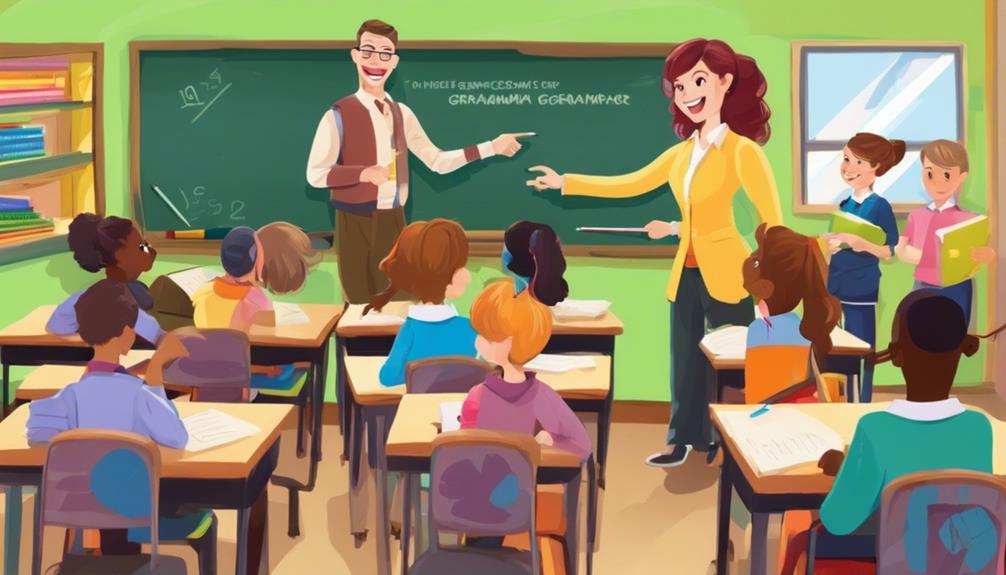
Enhancing our grammar skills through interactive picture scenes adds a dynamic element to speech therapy sessions. By incorporating grammar activities into these engaging visuals, we can effectively improve language skills and comprehension.
Here's why grammar practice within picture scenes is beneficial:
- Visual Context: Picture scenes provide a visual context for grammar concepts, making learning more interactive and fun.
- Targeted Language Goals: Using picture scenes for grammar practice allows us to target specific language goals in a meaningful and personalized way.
- Enhanced Skills: Grammar practice within picture scenes not only improves grammar but also enhances articulation, vocabulary, and sentence structure skills.
With these benefits in mind, integrating grammar practice into picture scenes can significantly enhance the effectiveness of speech therapy sessions, making learning both enjoyable and productive.
Frequently Asked Questions
How Do You Use Picture Scenes in Speech Therapy?
We use picture scenes in speech therapy to enhance language skills and boost engagement. By providing visual prompts, we create a context for practicing articulation, forming sentences, and storytelling.
These scenes help target specific goals like describing, inferencing, and answering WH questions. Children love the interactive nature of these sessions, making therapy enjoyable. Real pictures in our materials aid comprehension and retention for students of all ages.
What Are Picture Scenes and Sentence Formulation?
Picture scenes and sentence formulation involve using visual prompts to help clients develop their descriptive language skills.
By observing scenes with various objects and characters, clients can practice constructing detailed sentences. This process enhances expressive language, vocabulary, and storytelling abilities.
Engaging with picture scenes encourages clients to create meaningful sentences, fostering communication skills.
Through this practice, clients can improve their language production and sentence structure in speech therapy sessions.
What Is the Success Rate of Speech Therapy?
The success rate of speech therapy varies depending on the individual's condition and therapy goals. Research indicates that speech therapy can be highly effective in enhancing communication skills for many. Success is often gauged by improvements in speech clarity, language development, and communication effectiveness.
Early intervention and regular therapy sessions are crucial for positive outcomes. Incorporating engaging materials like picture scenes can further boost the success of speech therapy by promoting effective learning.
What Are the Visual Cues for Speech Therapy?
Visual cues in speech therapy encompass pictures, gestures, and other aids that support communication and language development. These tools enhance articulation, vocabulary, and overall communication skills for individuals with speech and language disorders.
They improve understanding, engagement, and learning during therapy sessions. Visual cues are especially beneficial for those struggling with auditory processing or verbal instructions.
Incorporating these cues makes learning interactive, effective, and enjoyable for clients of all ages.
Conclusion
In the vibrant world of speech therapy, these 10 picture scenes serve as colorful windows of opportunity for young learners to explore language skills. Like a painter adding brushstrokes to a masterpiece, these scenes help children develop their speech and communication abilities with creativity and joy.
With each scene, hidden treasures of language are uncovered, painting a path towards success in speech therapy.
Therapies and Interventions
10 Auditory Memory IEP Goals for Speech Therapy Success
Get ready to supercharge auditory memory skills with these 10 targeted IEP goals in speech therapy.

Enhancing auditory memory in speech therapy is vital for children's cognitive development.
With 10 targeted IEP goals focusing on auditory memory skills, therapists can help children achieve success in recalling and processing spoken information effectively.
From improving memory span to enhancing attention and sequencing abilities, these goals aim to strengthen auditory processing speed and memory recall.
By tailoring goals to each child's unique needs and monitoring progress, therapists play a crucial role in enhancing auditory memory skills.
Key Takeaways
- Set specific auditory memory goals in IEP for targeted improvement.
- Use repetition and association techniques to strengthen memory recall.
- Engage in multi-sensory activities to enhance auditory memory development.
- Incorporate auditory sequencing tasks to improve working memory skills.
Developing Auditory Attention Skills
Developing auditory attention skills is crucial in speech therapy for enhancing the ability to focus on and remember auditory information effectively. In speech therapy, we focus on improving auditory memory through targeted activities and exercises tailored to each individual's needs. By practicing skills such as repeating spoken words, following instructions, and accurately recalling auditory information, we aim to strengthen auditory attention abilities. These skills are vital not only for academic success but also for navigating social interactions and daily communication with confidence.
Individualized Education Program (IEP) goals often include objectives related to auditory memory enhancement. By setting specific targets for improving auditory attention skills within the IEP, we can track progress and tailor interventions accordingly. Speech therapists work closely with individuals with speech and language difficulties to design activities that challenge and strengthen their auditory memory capacities. As progress is made in developing auditory attention skills, individuals typically demonstrate improved abilities to recall, follow, and repeat spoken information accurately, leading to enhanced communication and overall well-being.
Improving Auditory Discrimination Abilities

Improving auditory discrimination abilities is essential for enhancing speech and language skills in therapy sessions. Auditory discrimination involves the ability to differentiate between similar sounds or words, a crucial skill in speech therapy. By targeting auditory discrimination through specific auditory memory IEP goals, individuals can learn to distinguish speech sounds accurately.
This training is particularly beneficial for those with auditory processing disorders, as it can improve comprehension and communication during therapy sessions. Enhancing auditory discrimination not only aids in recognizing subtle differences in sounds but also contributes to overall speech and language development. Speech therapists focus on honing these skills to ensure that individuals can effectively distinguish between various speech sounds, leading to improved auditory memory and better speech outcomes in therapy.
Through dedicated practice and targeted interventions, individuals can make significant strides in their auditory discrimination abilities, ultimately enhancing their overall speech therapy experience.
Enhancing Auditory Sequencing Proficiency
Enhancing auditory sequencing proficiency is a vital component of advancing speech and language skills in therapy sessions. It involves the ability to accurately recall and repeat a sequence of auditory information, which is essential for following instructions, understanding narratives, and retaining information in the correct order.
When setting IEP goals for auditory sequencing, focusing on improving working memory skills can enhance the accuracy and speed of recalling spoken sequences. These goals may include tasks like repeating spoken numbers, recalling lists in order, or reproducing sequences of sounds accurately.
Strengthening Auditory Memory Recall

While addressing auditory memory recall, we aim to strengthen the ability to accurately retain and recall spoken information. This is crucial for achieving success in academic and daily life tasks. Here are three key strategies to enhance auditory memory recall through IEP goals in Speech Therapy:
- Repetition: Encouraging repetition of spoken information helps reinforce memory recall and retention.
- Association Techniques: Teaching individuals to associate new information with existing knowledge can aid in memory recall.
- Multi-Sensory Activities: Engaging multiple senses during learning, such as combining visual aids with auditory input, can improve memory recall abilities.
Building Auditory Processing Speed
Addressing auditory processing speed involves implementing targeted exercises and strategies to enhance the interpretation and response time to auditory information. As Speech Language Pathologists, setting specific IEP goals aimed at improving auditory processing speed is crucial. By incorporating activities that challenge quick processing of auditory information, individuals can strengthen their ability to understand and respond promptly in various situations. These exercises may include listening to rapid speech, following multi-step directions, and engaging in activities that require quick auditory discrimination.
Improving auditory processing speed can significantly benefit individuals in academic settings, social interactions, and overall communication skills. Through consistent practice and tailored interventions, individuals can enhance their ability to process auditory information efficiently. Setting clear IEP goals focused on building auditory processing speed can lead to improved academic outcomes, better comprehension of verbal instructions, and enhanced participation in conversations. By working collaboratively with Speech Language Pathologists, individuals can make strides in developing this essential skill for effective communication.
Enhancing Auditory Comprehension Skills

Our focus lies in honing the essential auditory comprehension skills necessary for effective communication and interaction. When it comes to setting IEP goals for improving auditory memory in speech therapy, enhancing auditory comprehension skills is crucial.
Here are some strategies to achieve this:
- Repetition: Repeating information helps reinforce understanding and retention.
- Visual aids: Utilizing visual tools alongside spoken information can aid in comprehension.
- Chunking information: Breaking down spoken content into smaller, manageable chunks facilitates better understanding.
In speech therapy sessions, IEP goals may include tasks such as recalling spoken instructions, following auditory directions, and summarizing spoken content. Progress in enhancing auditory comprehension skills not only improves communication but also boosts academic performance and social interactions.
Improving Auditory Memory Span
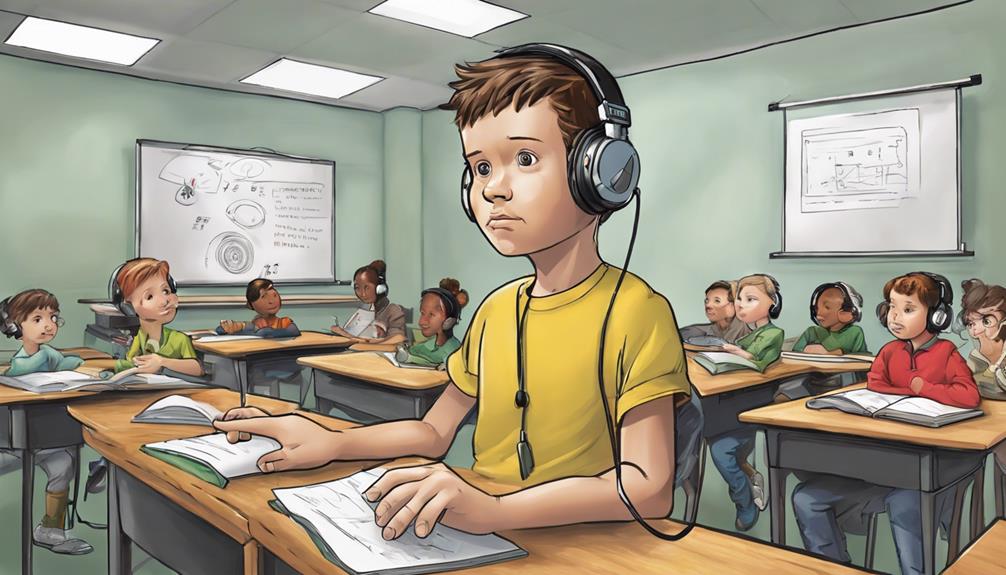
To enhance auditory memory span, it is essential to implement targeted strategies that focus on improving the ability to recall and repeat sequences of spoken information accurately. Setting IEP goals for auditory memory span involves tasks such as recalling spoken words, following instructions, and repeating numbers. Effective strategies for improving auditory memory span include repetition, chunking information, and using mnemonic devices. Progress in auditory memory span can be measured through assessments, observations, and data collection to track improvements over time.
| Strategies for Improving Auditory Memory Span | Examples |
|---|---|
| Repetition | Repeating sequences of numbers or words multiple times. |
| Chunking Information | Grouping information into smaller, manageable chunks. |
| Mnemonic Devices | Using memory aids like acronyms or visualization techniques. |
| Data Collection | Recording performance on memory tasks to monitor progress. |
Enhancing Auditory Memory for Instructions

Enhancing auditory memory for instructions involves honing the ability to accurately retain and recall spoken directives. When setting IEP goals for auditory memory in speech therapy, it's crucial to focus on improving the capacity to follow and execute multi-step directions effectively.
To enhance auditory memory for instructions, consider the following strategies:
- Repetition: Encourage repeating instructions to reinforce memory retention.
- Chunking Information: Break down complex instructions into smaller, manageable chunks.
- Visual Aids: Utilize visual cues or diagrams to support auditory memory development.
Strengthening Auditory Memory for Details

As speech therapists, we recognize the importance of strengthening auditory memory for remembering intricate details effectively.
By implementing detail retention strategies, individuals can enhance their memory skills and improve their ability to recall specific information accurately.
These techniques play a crucial role in supporting better comprehension and retention of crucial details in various conversations and instructions.
Detail Retention Strategies
Implementing repetition and rehearsal techniques is fundamental in strengthening auditory memory for details. To enhance detail retention, we recommend the following strategies:
- Encourage summarizing information actively to improve retention.
- Utilize visual aids and graphic organizers to support memory recall.
- Break down complex information into smaller, manageable chunks for better processing.
Enhancing Memory Skills
How can we effectively strengthen auditory memory for details in speech therapy to enhance memory skills?
Strengthening auditory memory skills is crucial for individuals to accurately recall and retain specific details from spoken information. This enhancement plays a vital role in facilitating the ability to follow multi-step directions with precision.
By developing auditory memory abilities, individuals can better remember sequences of unrelated spoken syllables and reproduce complex spoken sentences more accurately. Speech therapy focused on strengthening auditory memory can significantly improve an individual's capacity to retain and recall important details, such as phone numbers or instructions.
Setting IEP goals that target enhancing auditory memory skills can lead to notable advancements in an individual's ability to process and remember information effectively.
Developing Auditory Memory for Conversations

Improving auditory memory for conversations involves actively engaging in strategies that enhance the retention and recall of spoken information.
When working towards developing auditory memory skills specifically for conversations in speech therapy, it's crucial to focus on the following key points:
- Recalling Spoken Information: Practice recalling details from recent conversations to improve memory retention.
- Participating Actively: Engage in conversations by listening attentively and responding appropriately to strengthen auditory memory.
- Summarizing Discussions: Summarize conversations after they occur to reinforce memory and understanding of the content.
Frequently Asked Questions
What Are the Memory Strategies Goal for Speech Therapy?
In speech therapy, we focus on memory strategies to improve auditory memory skills. These goals help us recall and retain spoken information like words and instructions.
By using exercises like repetition and mnemonic devices, we can enhance memory. Visual aids and chunking info also support auditory memory.
Setting measurable goals allows us to track progress and customize interventions for effective therapy. These strategies lead to better communication and language development.
What Are the Goals for Auditory Discrimination in Speech Therapy?
In speech therapy, our goals for auditory discrimination focus on improving the ability to differentiate between similar sounds or words. By enhancing listening skills, phonemic awareness, and speech sound discrimination, we aim to strengthen auditory processing essential for speech and language development.
Specific objectives may include distinguishing between minimal pairs like 'pat' and 'bat' or 'ship' and 'sip.' Achieving these goals can lead to enhanced communication, speech clarity, and overall language proficiency.
What Is the Goal of Auditory Closure Speech Therapy?
We aim to enhance auditory closure skills in therapy to boost comprehension and communication. By filling in missing parts of spoken information, we help improve listening accuracy and memory.
Success in this area can lead to better academic performance and social interactions. It's a vital aspect of speech therapy that aids in overall language development.
What Are the IEP Goals for Phonological Memory?
We aim to enhance phonological memory through IEP goals. These goals target the ability to process and recall auditory information accurately. Objectives include improving word retention, following spoken instructions, and recalling sound sequences.
Strengthening auditory processing skills aids in effective communication and learning. By setting measurable phonological memory goals, individuals with auditory challenges can develop strategies for better information retention and retrieval.
These goals in an IEP can lead to improved speech therapy outcomes and academic success.
Conclusion
In conclusion, setting auditory memory IEP goals in speech therapy is essential for helping children improve their ability to recall spoken information accurately.
Just like a musician fine-tuning their ear to play a perfect melody, these goals help children sharpen their listening skills to better understand and retain information.
By focusing on specific auditory memory skills tailored to each child's needs, speech therapists can guide them towards success in communication and learning.
Jamie is one of the creative forces behind the words that resonate with our audience at Deaf Vibes. With a passion for storytelling and advocacy, Jamie delves into topics that matter deeply to the deaf and hard-of-hearing community. Jamie’s articles are crafted with empathy, insight, and a commitment to positive change, from exploring the latest advancements in hearing technologies to shedding light on the everyday challenges and victories of those within the community. Jamie believes in the power of shared stories to inspire action, foster understanding, and create a more inclusive world for everyone.
-
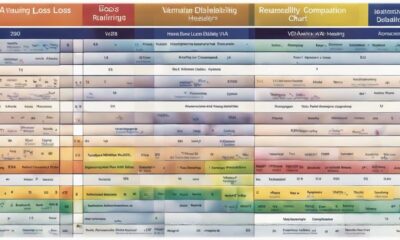
 Navigating the VA System2 months ago
Navigating the VA System2 months agoVA Hearing Loss Rating Chart: Understanding Disability Compensation
-
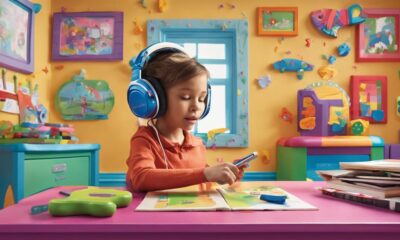
 Therapies and Interventions3 weeks ago
Therapies and Interventions3 weeks ago10 Auditory Processing Goals for Effective Speech Therapy
-

 Vetted2 months ago
Vetted2 months ago15 Best Oticon Hearing Aids to Improve Your Hearing in 2024
-

 Navigating the VA System1 month ago
Navigating the VA System1 month agoUnderstanding Bilateral Hearing Loss VA Rating Criteria
-

 Tinnitus2 months ago
Tinnitus2 months agoVA's Rating System for Tinnitus and Hearing Loss Explained
-

 Sign Language2 weeks ago
Sign Language2 weeks agoMastering the Art of Signing Letters in Sign Language
-

 Sign Language3 weeks ago
Sign Language3 weeks agoSign Language Emoji Translator: How to Communicate With Gestures
-

 Sign Language3 months ago
Sign Language3 months agoMedical Sign Language PDF: A Comprehensive How-To Guide



















